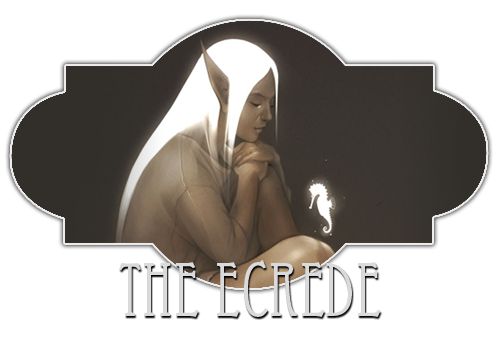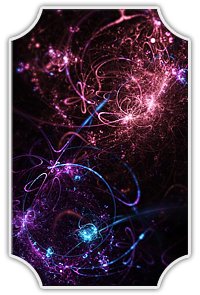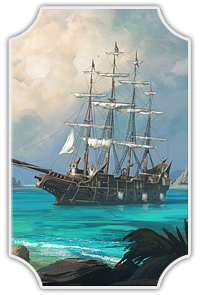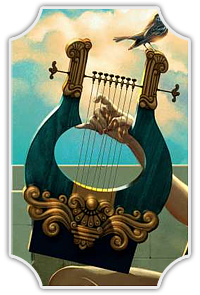The Ecrede

“They came to our shores from beyond the surf, in boats of the likes we had never seen before. Their shipwrights are far superior to any we have known throughout history or today. They called themselves the Ecrede, and we have both praised and cursed their existence ever since.” — Turnsten Hywyn, First King of Aramane.
| Origin | Age | Lifespan | Height | Deity | Race Perk |
| Native to Clead | Age of Defiance | 80-120 Years | 4'5"-6'5" | Lochren | 10 Mind |
History
The Ecrede are a seafaring race of inventors, pioneers, and explorers. They sail the known world, seeking out treasures, new lands, and experiences. Their sense of adventure makes it tricky for them to stay in one place too long, but that has never stopped them from designing and building whole cities, one of their most famous being Clead, a coastal city created to be one with the ocean. No one remembers quite where the Ecrede came from, not even themselves, but the limited documentation in the form of old scrolls that have been found tell of a collection of small islands that fan out in the shape of a shooting star, and a maker said to be able to control the sea.
Legends
The legend of Jevaun Kape tells of a man who sailed the first ship ever to grace Noar’s seas. Jevaun boasted that the ship was so admired by the god, Lochren, protector and keeper of the sea, that he bestowed Jevaun a gift, crafting a woman from the tide. Her hair was black seaweed, limbs long and flowing, and in her eyes he found the ocean, sapphires, emeralds, and gold.
Appearance

The Ecrede are a weathered, but beautiful race of people. Distinguishable to the rest of the world on account of their changing eye colour, a feature so closely intertwined with their emotions, that they change colour on account of the individual’s current mood. While their irises are a prominent feature of the race, they are also set apart by their hair colors, ranging from deep ocean blues to pale skies, seaweed green, white sea foam, blonde, and sandy browns— both light and dark. Ecrede hold within their veins blue blood that can be extracted for its healing properties and nearly every member of this race sports freckles across their bodies, due to sun exposure from long days on the open ocean.
Their attire reflects the sea and the freedoms it offers. Usually donning garments that allow for easy maneuvering, the Ecrede are guided to colors mirroring those of the ocean and the sun. Their modesty is limited to cotton wraps, but otherwise they don’t shy away from nudity once they’ve come of age.
Racial Ability
The Ecrede also have a special innate ability that allows them to form extremely powerful bonds with people. In the very beginning, the pair are likely to dream of one another, share ideas without giving them breath, and feel a strange attunement to each other’s emotions. This progresses into a state of awareness unmatched in other races, where one might feel the other’s pain and even develop signs and symptoms of the other’s illness, wound, and displeasure. It is not all bad, however, as the Ecrede bond shares as much good as it does bad. Feelings of euphoria, pride, and satisfaction are mirrored.
It has been recorded in historic scrolls that one of the pair in a bond can go without eating as long as their counterpart is able to eat, and that this will sustain both of them for a time. Bonded Ecrede or those who have found themselves linked to one, have survived in captivity for seasons at a time without being fed or watered, a feat in itself. Of course there is a price to pay for those who lose or sever their bonded partner, usually one of woe and great suffering. Severed Ecrede bonds are said to be like experiencing death itself, coupled with sadness that is partnered with a longing and emptiness that one never quite recovers from. In saying such, an Ecrede bond is very hard to undo, and usually takes death or something quite close to it in order to sever its tie.

At the most extreme end of the Ecrede bond, individuals have been known to take over one another’s consciousness, going as far as to trade forms for a brief amount of time. There is no record of how long this exchange lasts, as so few have ever been closely bound enough to achieve such successfully, said to take complete and utter trust to achieve. A total focus of concentration is needed for this, and can be undone with something as simple as a sneeze.
Ecrede may have lesser bonds with animals and experience, to a degree, the same ability manifestations as those listed above. However, beastial bonds that are broken due to death or detachment don’t affect the Ecrede as severely as a bond with another mortal being.
Forming a bond takes time, patience, and a mutual acceptance from both parties. A bond can never be forced, nor will it remain if fueled by hatred or fear for the other. Like a tether, it connects a pair from soul to soul, esen to esen, and must remain balanced or be broken from neglect. Multiple bonds will strain the Ecrede and may wear on their sanity. The most bonds any member of this race may carry are three, though they may only bond with one mortal at a time.
Philosophy
The Ecrede believe that all life was raised from the sea by Lochren’s hands and that one day, the world will be pulled back into its dark depths. They are a people who allow the currents of life to take them to parts unknown and happily exchange items and stories for the krowns they fancy. Ecrede are travelers and traders by nature, only taking up craft when their hands can no longer stand the burn of wet ropes on the boats they sail and choose a nomadic residency on the ocean rather than chaining themselves to the land. Freedom is a privilege all Ecrede fight for, though the honor and loyalty they are raised to have present conflicts when their clan’s priorities outweigh their own interests. It is natural for these people to yearn for more than what their means can provide, which is why they will stray from a righteous path if it means they can earn a profit. Very rarely will they risk banishment from their clan for their own interests, as a clanless Ecrede, or a N’chæl, is looked upon with such negativity, a slave would hold more worth when pair next to them.
Regardless of the reasons, N’chæl are automatically labeled as traitors, assuming they lack morals, loyalties, and hold their own needs higher than the rest. They are expected to be liars and thieves, a lowly scum of the world whose blood is not worthy to pass onto another generation. N’chæl are rarely taken in by another clan and find it difficult to trade with merchants who know of their title. Obstacles fall upon their path more so than an Ecrede who stands with the backing of a clan.
Perception
The majority of the world understand that the Ecrede are a gentle and fair race of traders and crafters. Their ships are valued by many of the other races from the major cities, who pay a high price for boats made by the Ecrede. Of course, there are always a few individuals that work against the good reputation the Ecrede have built for themselves, those who fall into the line of work of pirating and raiding smaller vessels, island villages, and camps, namely the N’chæl. Most people will stop in calm waters to trade with Ecrede, though they are careful not to leave their goods unattended. The Ecrede are excellent at bartering and driving a hard bargain, and often don’t settle for less than they feel an item is worth.
Food
Ecrede live on a fish based diet. On Clead, they are known to grow their own food, from animals to vegetables, however, this isn’t the case abroad. Ecrede don’t tend to stay in any one place long enough to grow crops or raise animals, choosing instead to trade with the local cultures to break up the monotony of eating a sole fish based diet. They like to spice their foods, usually making mild to hot ranging meals that other races find difficult to consume. Fish is eaten raw, marinated in citrus, such as lemon and lime.If cooked, it is done so quickly on a grill, or smoked until it is falling apart. Fish is also cured and dried to store for travel and trade.
Clans

Clans play a pivotal role within the Ecrede culture, serving as a guiding hand to the kin carrying their name, a layer of protection to those leagues from home and, a force to be reckoned with should someone attempt to attack. Within the homelands of Clead, not one clan rules the city but multiple, all working in tandem with each other through alliances arranged by trade or marriage to defend and maintain the city. These exchanges help strengthen their numbers and produce heirs to carry on their name and power.
Forming a clan is simple, it only takes two. There are hundreds of typical ecrede families with dozens of clan names across Noar, however, most of them hold little worth due to their trade and status. They mean nothing if they have nothing to offer, therefore it’s often difficult for these clans to secure alliances and often marry their children off to other clans of equal standing. Much of their status depends on what and where they trade, who they associate with and how.
Ships are more than simple vehicles of the sea. They are very much apart of a clan as a living being would be and hold value often higher than life itself. Obtaining a ship to sail the oceans is one way a clan advances their status in the world, keeping it above the surface of the waters is another. Transporting goods and services across lands is one of the last things to help garner influence to a name. Accumulating status and power within the Ecrede society is difficult, as they have many rivals and enemies that use underhanded means to sink their vessels, or pirates that lay siege to their ships and steal their vessels and gold.
The Ka’sul, or Chieftain, of an Ecrede clan is the highest ranking official and manages affairs relating to the business and politics within and beyond the clan while the Su’ka, or Chieftainess, is the second highest ranking official and manages the affairs of the house. When the Ka’sul is not present to finalize decisions on matters, the Su’ka has the right to act in his stead and enact laws or punishments without his direct permission. However, when the Ka’sul is present, he is the only one to rule on decisions.
The position of Ka’sul is usually secured by one of Ecrede birth, full blooded, and either the establisher or the first son to the previous leader. Outsiders are not usually recognized as Ka’suls and in most cases, will never come to earn such a position as their very blood impacts the clan negatively overall. However, rarely will half-bloods and other races secured the rank of Ka’sul through nearly impossible deeds, having earned it and the respect of those allied to them.
Ka’suls also have the privilege, or requirement, of taking on a second wife to ensure their bloodline. While the O’ma possess status and authority from her husband, she has no power to dictate decisions within the house or the clan, even if there is no authority above her available. Her duty is to the family and the Su’ka, taking care of and protecting the children, and seeing that they are educated. She may also act as a handmaid to the Su’ka, and carry out tasks from the Chieftainess when required.
Larger clans of high status employ a brand or tattoo that their kin may wear, but should they be banished for whatever reason, the mark will be burnt from their flesh or removed in a manner most unpleasant. Only ranked members within the clan are allowed to wear its markings, a gift given by the Ka’sul alone.
| Ka’sul | Su’ka-na | O’ma-na | Ka’ska |
| Chieftain | Chieftainess | Second Wife | First Son |
Names
The Ecrede are given two names at birth, their first name and surname (same as the Ecrede father, or Ecrede mother if the father is of another race), however, it is rare that an Ecrede individual will divulge their surname, especially to outsiders, as any Ecrede who is part of a clan uses their clan name in place of their surname (Example: Kai’el Rhoen Dre’kari, Dre’kari is his Clan name while Rhoen is his Surname. He will call himself Kai’el Dre’kari). Surnames are used by N’chæl and are often distinguishable by this feature alone. Popular letters used for Ecrede names include, but aren’t limited to, C, D, E, F, H, J, K, and R. It isn’t uncommon to find similar letters grouped together in names, such as, Ca, Cai, Da, De, Dar, Ha, Har, Ja, Je, Jai, Ji, Ka, Kai, Ke, Ra, Rah, Rai.
Language
Ethesion is a harsh language made up of complex but short sentences. Ethesion does not follow the same progressions as the common tongue, and often doesn’t translate well. Many words in Ethesion share the same meaning, but used in the right context, are vastly different. Ethesion is said to be known as one of the hardest languages to learn, especially if an individual's first or only language is common.
Education
Most Ecrede children are homeschooled as the traditional education systems of other races do not suit their way of life. The Ecrede are a hands-on race that learn best by doing, making them very practical people. Wealthier clans often employ well-traveled members of their race to teach their children about the world and ocean.

Music
The Ecrede have long mastered string instruments, but it is their love of the Lyre that sets them apart. The Ecrede have been known to hypnotise people with Lyre music, said to help with healing and relieving stress. It is common to hear the soft, melodic notes of the instrument playing in taverns and other public places around the city. Captains of ships usually hire Lyre players to keep their crew in good spirits over long journeys. Harps are kept in the homes of the wealthy, used as a symbol of significance in Ecrede culture. Mastering either of these instruments makes individuals very popular in Clead.
Craft
The Ecrede are a race of traders, known for sailing far and wide to secure the best deals and bargains. They love exploring the world and collecting treasures from far away places to bring back and tell tales about. In order to make a lot of these trades, they are known to craft beautiful pieces of jewelry, pearl necklaces and earrings, fashionable toe-rings and piercings. They also enjoy crafting hair pieces, and items using beautiful bird feathers. However, they are best known for their fish-scale armor, made and found only in Clead. It is said, also, that no one builds a better boat than an Ecrede.
Traditions
Right of passage in Ecrede culture takes place on the ocean, where individuals are tasked with sailing out into deep waters off the cost of Clead, to go in search of Tuna, a sub-tropical fish that is highly valued among the Ecrede people.
Birth
Traditional Ecrede births take place in natural rock pools along the edge of the ocean, or for those who are city bound, some kind of bath that allows for a water birth. Births are highly celebrated, and often, the mother, grandmother, and sisters of the individual giving birth are there to provide support. It isn’t unusual for Ecrede’s to birth twins, though they have a low rate of conception
Marriage
Marriage within the Ecrede culture is often arranged. One usually grows up already betrothed to another and after their coming of age ceremony, they are then wedded. Ecrede who have no arranged marriage are either runaways or children of parents who have forsaken the traditions of the culture to pursue freedom over status and security. It is very rare that a highly recognizable clan would decline marrying their children off to secure alliances, as these prompt both gold and protection.

A marriage ceremony is sacred and large as both clans and their Ka’sul’s are required to be in attendance, as well as a political representative to witness and officiate the marriage certificate. Days before the marriage, both clans gather within the bride’s home residence (usually she still remains with her father and mother) and celebrate by participating in several competitions. One tradition is catching food from the sea to be prepared for the wedding, while another is a boat race. On the night of the wedding the bride and groom are prepared in baths of saltwater and washed with scented soaps before dressing to depart towards the temples in garments of blue and white. Their path will often be marked by clansmen with white sand and lotus flower petals, a symbol of purity and longevity. Before the temple stairs, the bride and groom will carry gifts offered to them by their clansmen to the shrine of their deity and give prayer and meditate.
Before the ceremony, the bride and groom are dressed in formal white and blue robes and adorned with jewelry from head to toe. They are then escorted from their homes to either a temple or the beach to await the joining of all parties, both the bride, the groom, their Ka’sul’s, and their clansmen. Once vows and torcs are exchanged, their robes are to be removed to ceremonial undergarments and they are to be bound at the waist and made to wash their bodies and hearts within the sea, joined as one.
After the ceremony, celebrations resume for the day before the newly weds are sent away to their own private dwelling to consummate their marriage.
Ka’sul’s normally gift their newly wedded kin homes to begin their families in. The Chieftain that bargains marriage for an alliance is normally the one who must pay for the wedding and house of the bride and groom.
Divorce is allowed among the Ecrede, though frowned upon. Should a separation take place, the wife must leave the clan she was married into and beseech her previous one to take her in or be labeled as a N’chæl and lose all rank and status among the people. Su’kas who divorce from Ka’suls must follow the same process and once finalized, the O’ma will replace the previous Su’ka in rank and responsibilities.
Faith
The Ecrede worship Lochren, Father of Sea and Storms. All Ecrede are born of the sea and return to it upon their death, believing that their lives are very closely tied to the God of the Sea, making them a very spiritual race when it comes to water, but specifically the ocean. In all four seasons Lochren is worshiped and celebrated by the Ecrede people.
The Ecrede also celebrate lesser Gods in festivals that take place four times a year on the first day of each new season. In Bloom, the Goddess of Dreams and Fables, Astra, is worshiped in a day where Ecrede come together to share stories and aspirations with one another. Some Ecrede Clans erect straw statues they decorate with flowers, while others dress or paint themselves colorfully to participate in traditional dances. On the first of Harvest, a festival for Hythe, God of Music and Song is worshiped. Ecreded pride themselves on their skill with string instruments, especially the Lyre. A giant feast is had, with all clans coming together to share different dishes they are famed for preparing.
In Frost, Nyne, Goddess of Moons and Stars is worshiped. The dress theme is blue and white, with gildings of silver and pearl. For the Ecrede, in Frost, it is traditional to fast during the daytime and eat only at night. Finally, Sryn, God of Sun and Sky is celebrated in Blaze. Red and Gold are the colours of the Blaze festival. Craft and trade are the main themes of this festival. Trading something of high value with someone who has far less than you is considered good practice and the Ecrede believes brings them luck for the year.

Death
Life and Death in the Ecrede culture is a celebration. In death, the lives of individuals who pass on are honoured by their clan in a ritual that takes place within a sacred temple. Though all death is tied to sorrow, Ecrede keep the bodies of those who have passed on at home for three days after a death has occurred, giving them time to mourn the loss of a loved one. What takes place in the temple, however, is a celebration ceremony of the individuals life. Food and drink is shared, stories are told, and songs are sung.
The body of the dead individual is lowered into a natural, deep pool of crystal clear water, colourful with ocean reefs, fish, vibrant seaweeds, and pearlescent stones and shells. If a living person falls into the water, the water thickens and turns into a gel like substance that stops the person from sinking or moving any further into the water. When a dead body enters the water, however, the water turns an inky black colour. The dark tentacle of a legendary creature from folklore rises up from the depths and slowly pulls the body into the abyss.
ADD INFO ABOUT DEATH OUTSIDE OF CLEAD --- HOW DO THEY MOURN IT?